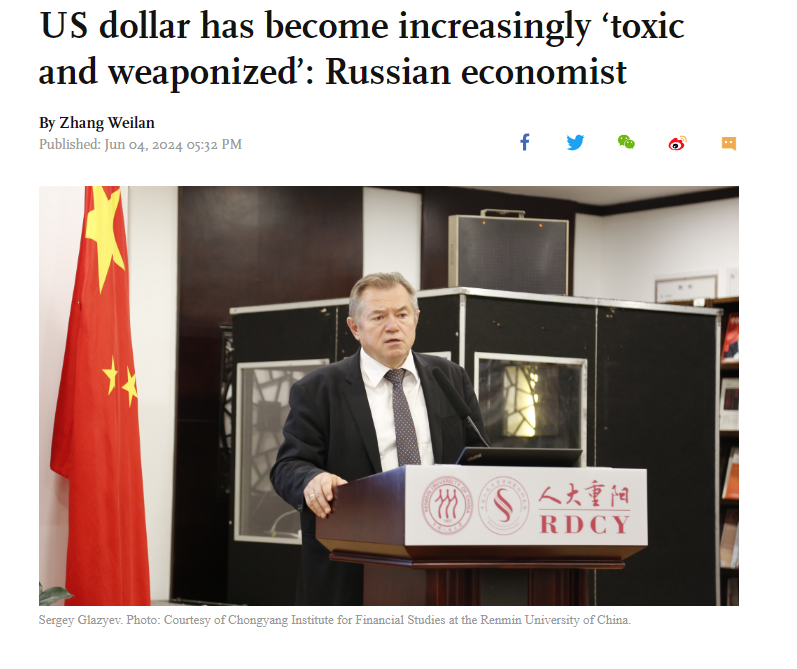LATEST INSIGHTS
Your Present Location: LATEST INSIGHTSSergey Glazyev: US dollar has become increasingly ‘toxic and weaponized’: Russian economist
Source: GT Published: 2024-06-04

China and Russia should 'team up to reduce reliance on the US dollar,' further explore integration in their financial infrastructure and expand currency settlement cooperation, as the US dollar has become increasingly 'toxic and weaponized,' a Russian economist told the Global Times in an interview.
'The yuan is now the only reserve currency of the IMF that is not politically toxic. On the contrary, the main problem for Western currencies such as the US dollar, the euro, the pound and the yen is a lack of trust. They are being used as political weapons,' said Sergey Glazyev, commissioner for integration and macroeconomics at the Eurasian Economic Union.
In recent years, the yuan has seen a significant increase in scenarios such as international payments, trade financing and foreign exchange transactions, Glazyev said on Friday at the Chongyang Institute for Financial Studies at the Renmin University of China, based in Beijing.
The yuan is increasingly used in international transactions by more and more of China's trade partners, such as Russia.
'Practical cooperation between Russia and China continues to grow steadily despite global geopolitical turbulence. For more than a decade, China has held the position of Russia's top trade partner, and in 2023, Russia rose to fourth place among China's foreign trade partners.
'Meanwhile, their currencies - the ruble and the yuan - now account for more than 90 percent of all mutual trade transactions,' Russian Foreign Minister Sergey Lavrov said on May 30.
According to Glazyev, Russia is striving to accelerate de-dollarization and speed up integration with the Chinese financial market, and there is an increase in the willingness of Russian companies to cooperate with their Chinese counterparts.
To accelerate integration in financial infrastructure, Glazyev proposed that the two countries develop a mechanism for settlement currencies. In parallel, there is an ongoing effort to develop a digital non-banking payment system, which would be linked to stablecoins such as gold, silver and other exchange-traded products, he said.
Perhaps in the near future, BRICS countries can create a new world currency in digital form, guaranteed by commodities and in accordance with international practices, he said.
China is advanced with real-life trials of e-CNY (digital yuan), according to a Reuters report on March 27.
Glazyev said that both Russia and China have announced that they have in place a central bank digital currency.
Digital currencies are designed to accelerate international settlements, reduce processing fees for cross-border fund transfers and provide emerging markets with an affordable gateway into the global financial network.
More efforts are needed to enhance the yuan's convenience in cross-border settlements, Glazyev said.
The latest SWIFT data showed that the yuan's share in international payments reached 4.69 percent in March, and the currency retained its position as the fourth most actively used in global payments, ahead of the yen. Experts said that this mirrors steady progress in the yuan's internationalization and the growing appeal of the yuan as a currency for global payments and settlements.
During the interview, Glazyev also talked about China's economy. China's economy is diverse and dynamic, Glazyev said, adding that China is leading in many high-tech areas such as solar energy and artificial intelligence, and other information technologies.
China's economic management system is effective, especially in stimulating private investment. The banking system is also oriented toward investment, as China has the largest capital accumulation rate in the world, which is a key driver for growth, he noted.























































































 京公网安备 11010802037854号
京公网安备 11010802037854号





